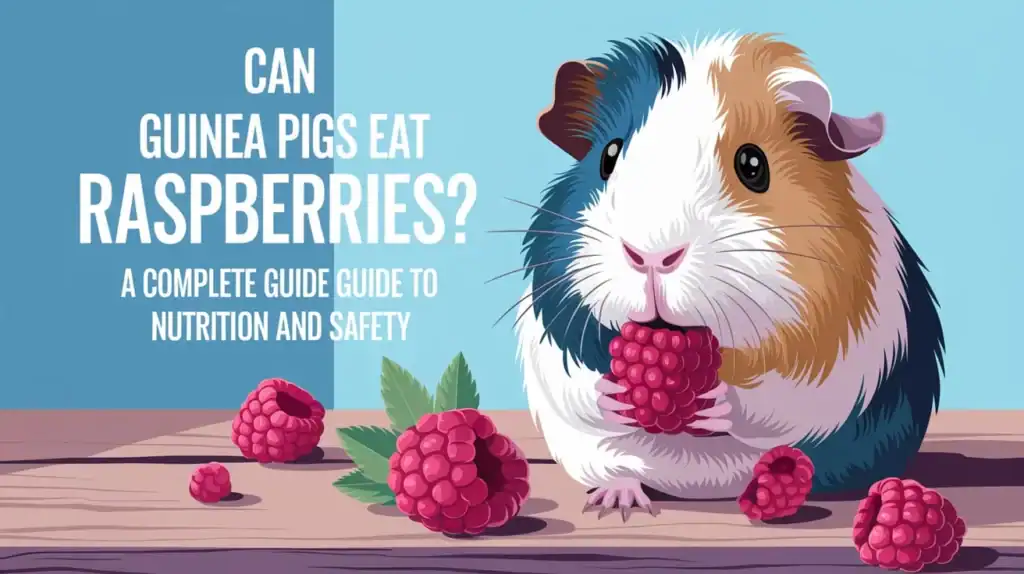Guinea pigs are adorable, social creatures that thrive on a balanced diet of hay, fresh veggies, and the occasional fruit treat. But when it comes to fruits like raspberries, many pet owners wonder: Can guinea pigs eat raspberries? The answer is yes—but with some important caveats. In this comprehensive guide, we’ll dive deep into the nutritional benefits, potential risks, and best practices for feeding raspberries to your furry friend.
Can Guinea Pigs Eat Raspberries? The Short Answer
Yes, guinea pigs can eat raspberries, but only in moderation. Raspberries are safe for guinea pigs and even offer some health benefits, but their high sugar content means they should be an occasional treat, not a regular part of their diet.
Here’s a quick breakdown:
- Safe to eat: Yes.
- Frequency: 1-2 raspberries, 1-2 times per week.
- Preparation: Wash thoroughly and cut into small pieces.
Nutritional Breakdown of Raspberries
Raspberries are packed with nutrients that can benefit your guinea pig, but they also contain elements that require caution. Let’s break down the nutritional profile of raspberries (per 100g):
| Nutrient | Amount | Why It Matters for Guinea Pigs |
| Calories | 53 kcal | Low-calorie treat, but sugar adds up. |
| Vitamin C | 26.2 mg | Essential for preventing scurvy. |
| Fiber | 6.5 g | Promotes healthy digestion. |
| Sugar | 4.4 g | Can lead to obesity and dental issues if overfed. |
| Calcium | 25 mg | Important but can cause bladder stones in excess. |
| Phosphorus | 29 mg | Works with calcium for bone health. |
| Water Content | 86% | Helps keep guinea pigs hydrated. |
Why These Nutrients Matter
- Vitamin C: Guinea pigs cannot produce their own Vitamin C, so they rely on their diet to meet this need. Raspberries provide a decent boost.
- Fiber: Essential for maintaining a healthy digestive system, which is critical for guinea pigs.
- Sugar: While natural, too much sugar can lead to health problems like obesity and diabetes.
- Calcium and Phosphorus: These minerals are important for bone health, but an imbalance can lead to bladder stones.
Health Benefits of Raspberries for Guinea Pigs
Raspberries aren’t just a tasty treat—they offer several health benefits for guinea pigs when fed responsibly:
Rich in Antioxidants
Raspberries are loaded with antioxidants like Vitamin C and quercetin, which help protect your guinea pig’s cells from damage caused by free radicals.
Boosts Immune System
The high Vitamin C content in raspberries supports a strong immune system, helping your guinea pig fight off illnesses.
Promotes Hydration
With an 86% water content, raspberries can help keep your guinea pig hydrated, especially during warmer months.
Supports Digestive Health
The fiber in raspberries aids in digestion, preventing issues like bloating and constipation.
Risks and Precautions
While raspberries are generally safe, there are some risks to be aware of:
High Sugar Content
Raspberries contain natural sugars, which can lead to:
- Weight gain
- Dental problems
- Diabetes
Calcium to Phosphorus Ratio
Raspberries have a slightly imbalanced calcium-to-phosphorus ratio. Too much calcium can contribute to bladder stones, a common issue in guinea pigs.
Oxalates
Raspberries contain small amounts of oxalates, which can contribute to kidney stones if fed in excess.
Choking Hazard
Whole raspberries can be a choking hazard. Always cut them into small, manageable pieces before feeding.
How to Safely Feed Raspberries to Guinea Pigs
To ensure your guinea pig enjoys raspberries safely, follow these guidelines:
Frequency
- Feed 1-2 raspberries, 1-2 times per week.
- Avoid daily feeding to prevent sugar-related health issues.
Preparation
- Wash thoroughly: Remove any pesticides or dirt.
- Cut into small pieces: Prevents choking and makes it easier to eat.
Serving Suggestions
- Mix raspberries with other guinea pig-safe veggies like bell peppers or leafy greens.
- Use raspberries as a training treat or reward.
Monitor Your Guinea Pig
After introducing raspberries, watch for any signs of:
- Diarrhea
- Bloating
- Allergic reactions
Alternatives to Raspberries
If you’re looking to diversify your guinea pig’s diet, here are some other safe fruits to consider:
| Fruit | Benefits | Feeding Frequency |
| Strawberries | High in Vitamin C and fiber. | 1-2 times per week. |
| Blueberries | Rich in antioxidants. | 1-2 times per week. |
| Apples | Good source of fiber (remove seeds). | 1-2 times per week. |
| Melon | High water content for hydration. | 1-2 times per week. |
Remember, fruits should always be a small part of your guinea pig’s diet. The majority of their nutrition should come from hay and fresh vegetables.
Frequently Asked Questions (FAQs)
Can Guinea Pigs Eat Raspberry Leaves?
Yes, raspberry leaves are safe and even beneficial for guinea pigs. They’re high in fiber and can be fed in moderation.
Can Baby Guinea Pigs Eat Raspberries?
It’s best to wait until your guinea pig is older (around 4-6 months) before introducing raspberries. Stick to hay and pellets for young guinea pigs.
What Happens If My Guinea Pig Eats Too Many Raspberries?
Overfeeding raspberries can lead to:
- Diarrhea
- Bloating
- Weight gain
- Dental issues
If you notice any of these symptoms, reduce or eliminate raspberries from their diet and consult a vet if necessary.
Conclusion
Raspberries can be a delicious and nutritious treat for your guinea pig when fed in moderation. They offer essential nutrients like Vitamin C and fiber, but their high sugar content means they should only be an occasional addition to your pet’s diet.
Key Takeaways:
- Feed 1-2 raspberries, 1-2 times per week.
- Always wash and cut raspberries into small pieces.
- Monitor your guinea pig for any adverse reactions.
By following these guidelines, you can safely treat your guinea pig to raspberries while keeping them healthy and happy.
Have you tried feeding your guinea pig raspberries? Share your experience in the comments below!

